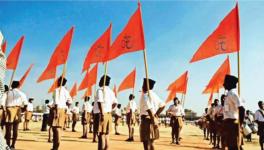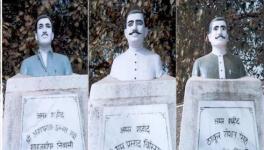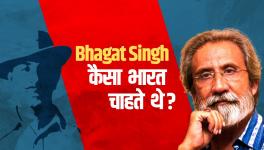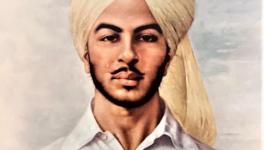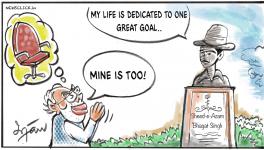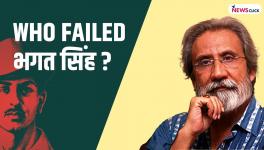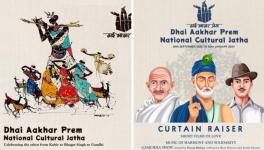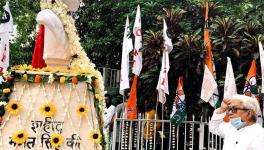‘To Students...With Love, Bhagat Singh’
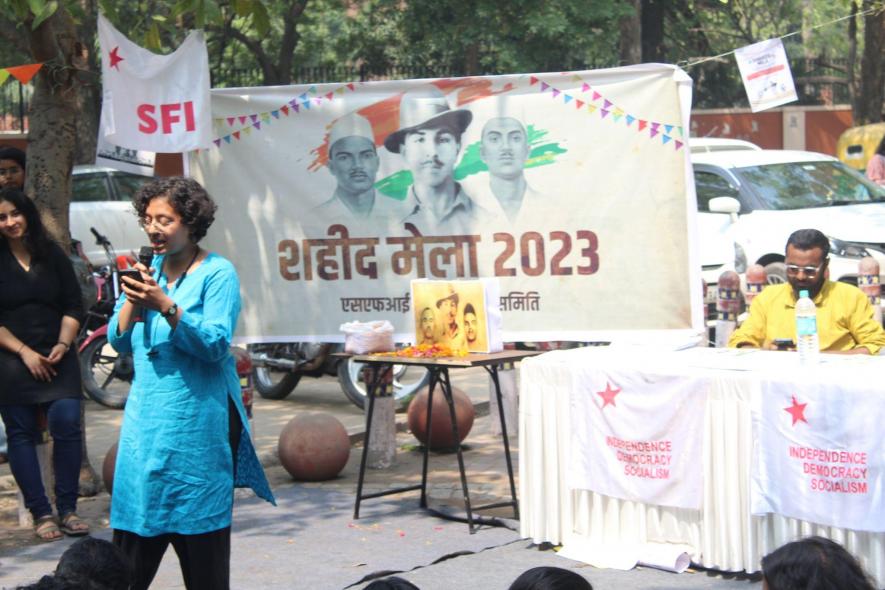
On March 22, the Students’ Federation of India (SFI) organised ‘Shaheed Mela 2023’ in the University of Delhi commemorating Bhagat Singh, Sukhdev and Rajguru and many other heroes of the Indian freedom struggle. The three were hanged to death by the British colonial government at the age of no more than 23 years. The mela, consisting of book stalls, selfie booths, and cultural performances, saw participation from over 500 students.
On the occasion, the SFI Delhi state committee released a booklet titled ‘To Students.. With Love, Bhagat Singh’, which was launched by the chief guests -- Major General Sheonan Singh Vir Chakra, a nephew of Bhagat Singh, and retired professor Chaman Lal, who is an honorary advisor at the Bhagat Singh Archives and Resource Department.
The booklet brings out two very important essays of Bhagat Singh -- ‘Student and Politics’ and ‘Letter to Young Political Workers’ --with a foreword written by Chaman Lal. It also contains an epilogue by the editor discussing how these two essays should be read in consonance with each other to fully understand the message that Bhagat Singh wanted to convey to students and youth of the country.
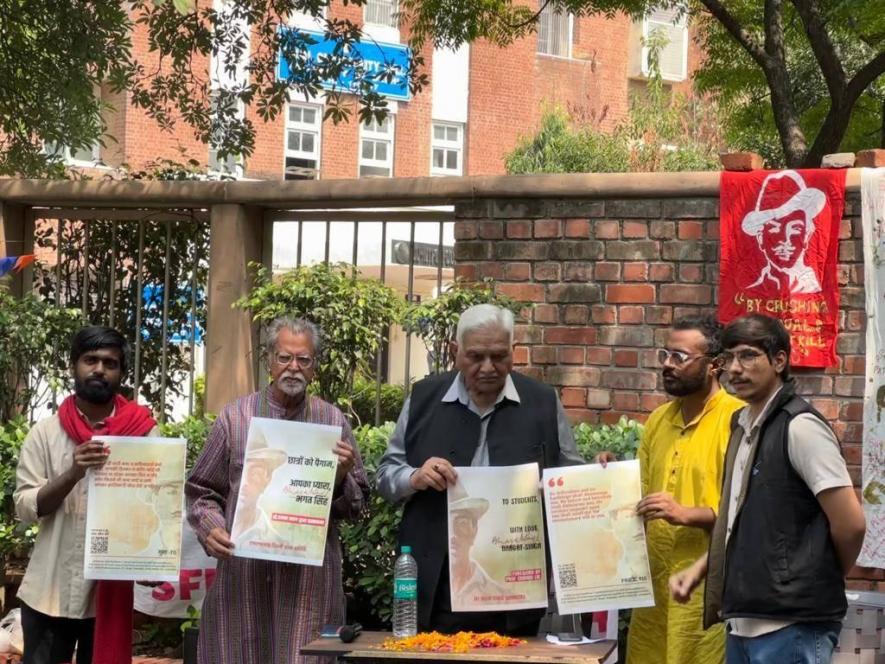
On the occasion of Bhagat Singh’s martyrdom day today, here is the epilogue from the booklet, in the hope that his message reaches as many young people of the country as possible.
The Epilogue
In today’s times, where the attack on institutions of public education is at an all-time high, the government has introduced the National Education Policy and under it has initiated the Four- Year Undergraduate Programme throwing them open to be taken over by private players who at their whims will make these institutes further inaccessible to the marginalised sections of society.
In such times, it is absolutely essential to understand Bhagat Singh’s ideas and his dream of a free and equal India. The two essays republished in this booklet ‘Student and Politics’ and ‘Letter to Young Political Workers’ are meant to be read together in a certain consonance. These two essays clearly show us, the students and the youth of today, what Bhagat Singh’s expectations from the country’s youth was and remains. He sees young people as revolutionaries who should live a life of constant struggle and drop all delusional ideas of a better country and a better society being attained in a matter of a few years. In this ending note, let us understand the ideas of Bhagat Singh and his message to students by discussing the two articles together.
In the first essay ‘Student and Politics,’ Bhagat Singh is making an appeal to all students to be critical of the forces that in the guise of being concerned for their well-being, are trying to chain their minds to a certain kind of education and politics, the kind that’s favourable to them. He begins by mentioning the condition in Punjab University in his time where students were asked to sign an undertaking saying they would not participate in any political activities.
This kind of alienation of students from politics, and eventually from society itself, is prominent today as well. If we consider universities in Delhi, the administration of Jawaharlal Nehru University of Delhi, Jamia Millia Islamia, or Ambedkar University Delhi, all have begun to impose rules regarding gatherings that are political in nature.
The administration has become so fearful of critical thought in students that even permission related to holding study circles or academic lectures are being denied. Only those programmes are approved that have backing of a prominent teacher, in-charges, or heads of departments. And all these positions are filled by people preferred by the ruling class to carry out their mission in educational institutions -- in the current scenario, the mission of Rashtriya Swayamsevak Sangh (RSS).
Bhagat Singh uses an example of a boy reading an ‘Appeal to the Young’ by Prince Kroptkin who is accused by his professor that, “You are a Bolshevik because you are reading political books.” All critical thinking and politically aware students go through this kind of interrogation and accusations today as well. Any time a student raises questions, s/he is termed a ‘Leftist’ or ‘etheist’ or ‘Neta ji’. They think that by doing this, they can break the revolutionary spirit of students, but it these puppets of the ruling classes don’t know that once a student has begun to raise questions, s/he will only go on to raise more questions, go further in search of rationality when answered with irrationality.
The revolutionary will of students can never be stubbed, as by entering these very educational institutes and by raising questions against the existing order, they have set themselves onto a revolutionary path. Many of them go on to become young political workers.
The booklet’s second essay, ‘To Young Political Worker’ discusses critical thinking and questioning and not separating politics from education. Bhagat Singh says that young political workers should demand nothing less than a complete revolution. He defines this revolution as, “…the complete overthrow of the existing social order and its replacement with the socialist order.”
In this two-part essay, the first part is devoted to explaining ‘compromise’ as an integral tool for political strategy. A clear distinction is shown between how the bourgeoisie elite parties use this as a tool for their benefit and never for the benefit of the large section of Indian society that remains oppressed and unbenefited from any of their political developments.
Bhagat Singh appeals to young workers to understand that any ‘compromise’ should work in benefit of the oppressed and the exploited classes and not in the benefit of the oppressor and the exploiter. Through the example of fighting for 16 annas, he expressed that we should pocket the one anna we get and fight for the rest in order to sustain our struggle.
In the second part, he provides young political workers with a clear line of action. This line of action requires the young worker to define three things: 1) The Goal, 2) The Existing Conditions (Starting point), and finally 3) The Course of action (means and methods). He says that for a socialist revolution, the preliminary is a ‘political revolution’. He defines it as, “The political revolution does not mean the transfer of state (or more crudely, the power) from the hands of the British to the Indian, but to those Indians who are at one with us as to the final goal..” In multiple instances he makes it clear that this group is the workers, the peasants, and all other oppressed groups.
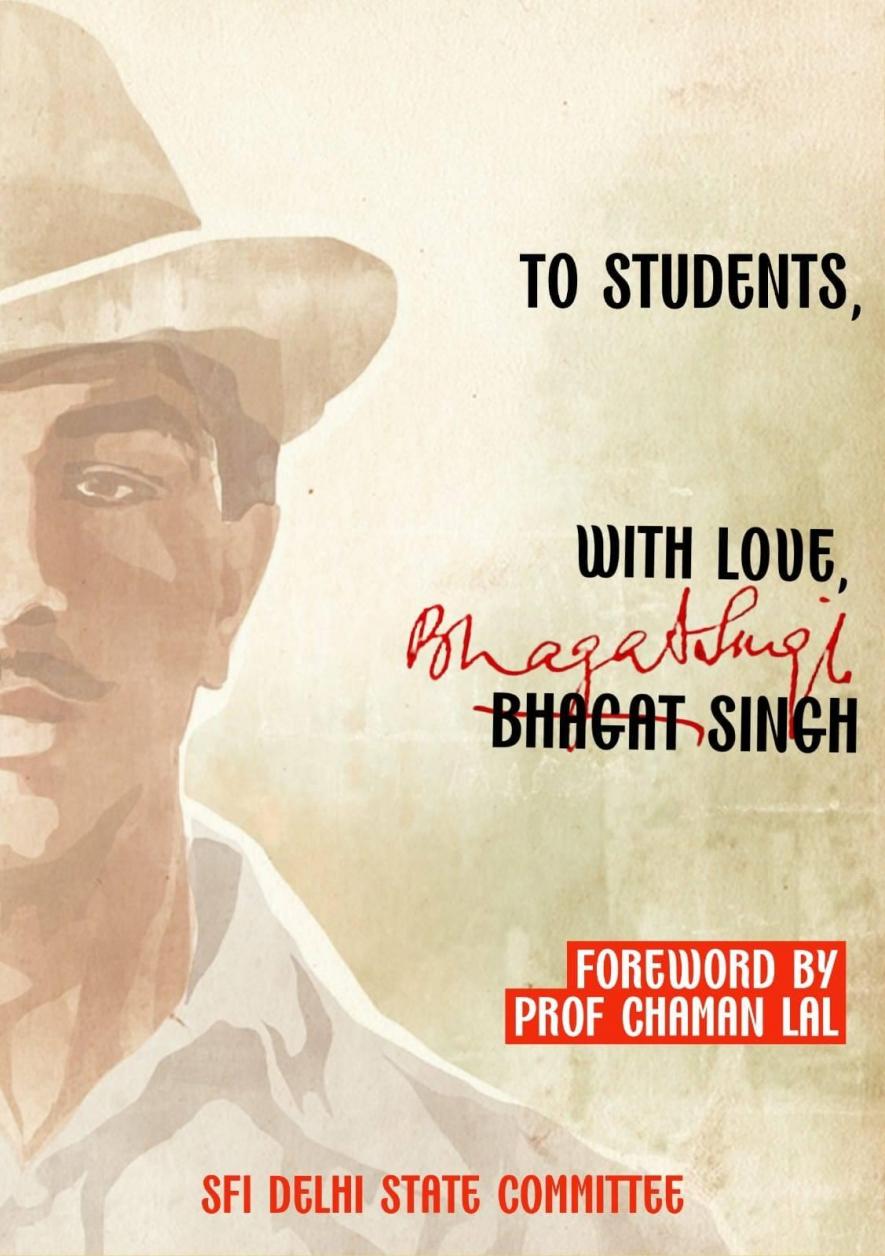
How do we then understand Bhagat Singh’s message to students from these two essays written far apart in time, one in July 1928 and the other in February 1931? Through these essays, one should understand the logic of exploitation and the path to overcome it that Bhagat Singh has armed us with. And finally, how in these different contexts, the logic and the path remains the same.
Bhagat Singh wrote both these essays in the context of his time, guiding the young people of the country to move towards a better, more equal, more democratic, and a socialist society. Even though a lot of time has passed, the exploitative structures of capitalist societies remain the same in our country. This is why Bhagat Singh’s message is relevant as long as these structures exist. Hence, it remains the duty of students and youth to question these structures, analyse them and eventually break them and then build in its place a society based on the principles of ‘Independence, Democracy, and Socialism’.
The writer is a post-graduate student in Ambedkar University in New Delhi, studying law, politics and society. He is a member of the SFI Delhi State Secretariat. The views are personal.
Get the latest reports & analysis with people's perspective on Protests, movements & deep analytical videos, discussions of the current affairs in your Telegram app. Subscribe to NewsClick's Telegram channel & get Real-Time updates on stories, as they get published on our website.









